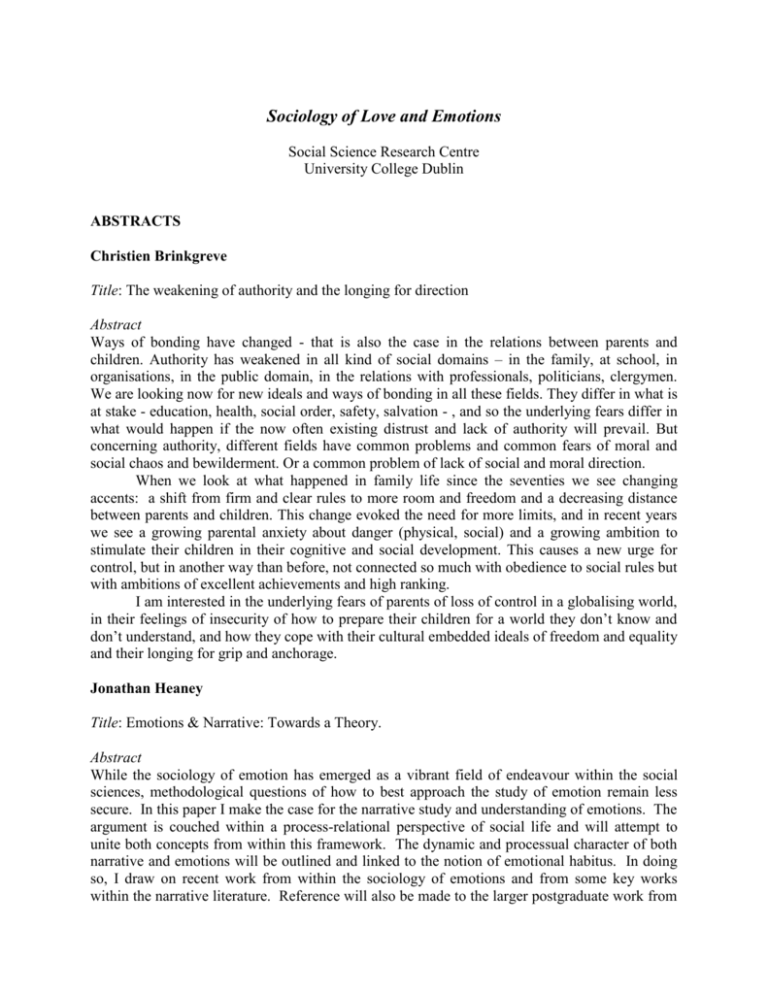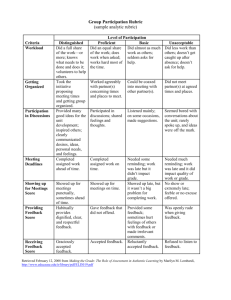Christien Brinkgreve - University College Dublin
advertisement

Sociology of Love and Emotions Social Science Research Centre University College Dublin ABSTRACTS Christien Brinkgreve Title: The weakening of authority and the longing for direction Abstract Ways of bonding have changed - that is also the case in the relations between parents and children. Authority has weakened in all kind of social domains – in the family, at school, in organisations, in the public domain, in the relations with professionals, politicians, clergymen. We are looking now for new ideals and ways of bonding in all these fields. They differ in what is at stake - education, health, social order, safety, salvation - , and so the underlying fears differ in what would happen if the now often existing distrust and lack of authority will prevail. But concerning authority, different fields have common problems and common fears of moral and social chaos and bewilderment. Or a common problem of lack of social and moral direction. When we look at what happened in family life since the seventies we see changing accents: a shift from firm and clear rules to more room and freedom and a decreasing distance between parents and children. This change evoked the need for more limits, and in recent years we see a growing parental anxiety about danger (physical, social) and a growing ambition to stimulate their children in their cognitive and social development. This causes a new urge for control, but in another way than before, not connected so much with obedience to social rules but with ambitions of excellent achievements and high ranking. I am interested in the underlying fears of parents of loss of control in a globalising world, in their feelings of insecurity of how to prepare their children for a world they don’t know and don’t understand, and how they cope with their cultural embedded ideals of freedom and equality and their longing for grip and anchorage. Jonathan Heaney Title: Emotions & Narrative: Towards a Theory. Abstract While the sociology of emotion has emerged as a vibrant field of endeavour within the social sciences, methodological questions of how to best approach the study of emotion remain less secure. In this paper I make the case for the narrative study and understanding of emotions. The argument is couched within a process-relational perspective of social life and will attempt to unite both concepts from within this framework. The dynamic and processual character of both narrative and emotions will be outlined and linked to the notion of emotional habitus. In doing so, I draw on recent work from within the sociology of emotions and from some key works within the narrative literature. Reference will also be made to the larger postgraduate work from which this paper emerges, and I hope to be able to present some empirical findings in support of my argument from this work, based on my own biographical-narrative interviews. Tom Inglis Title: Mapping the underground of social life: Love as the key emotion. Abstract In the academic division of labour, love, like other emotions, still remains outside the realm of sociology and, by and large, within the boundaries of psychology and social-psychology. In sociology it has been confined to the realm of affective action, subjective meaning, and personal experience. Any recognition of its significance as a medium of communication, and creating and maintaining meaning, is thwarted because it operates in and around rational action and is seen more as a distortion of rather than foundation for reasonable communication. In this paper, I will argue that the key two social emotions are not pride and shame, but love and hate. I suggest that pride and shame act more in the realm of external forms of social constraint that have become internalised. They are subtle, penetrative form of discipline and control. They are rooted in a pessimistic view of human being that sees social action as primarily individualistic and competitive. Life is an ongoing struggle to attain and maintain honour and respect and avoid embarrassment and repugnance. On the other hand, I argue that the feelings of love, of identification with and bonding to the other which become linked with a surrender and denial of the self, are central to social life. These strong ‘we’ feelings are in contrast to, but often linked to and dependent on feelings of fear, distrust, envy, loathing and hatred of ‘others’, those who do not belong to the group, clan, tribe, gender, religion, family, group, class, ethnicity or race. The empirical question then is when, where, how and among whom feelings of love that come from friendship, romance, compassion and attachment, overcome feelings of fear, distrust and hatred of the other. I argue that as well as the need for a long-term historical perspective that traces the origins and development of romantic love and, in particular, the sexualisation of romance, there is a need to describe and analyse the links between the different forms of love and the ways people balance love and sex, pleasure, commitment, pride and work. There is a need to develop concepts that help identify and describe the ways in which people create and maintain feelings of love. Finally, there is a need to develop methodologies that enable researchers to bring love to the surface of social life and reveal its different dimensions and the ways in which it operates in everyday social life. Rebecca Chiyoko King-O’Riain Title: Packing Up Your Emotional Baggage and Taking It On The Road’: Translating Concepts, Practices and Issues of Love in Transnational Couples and Families Abstract This paper examines how ‘love’ (both romantic and familial) is socially constructed within different cultures in a globalizing world. Through interviews with international couples and their children, it examines how love is ‘socially constructed’ and varies from country to country or culture-to-culture, how people learn what ‘love’ is and how they ‘practice’ and ‘do’ love in both emotional and relational ways. In particular, it seeks to understand how increasing globalization is impacting people’s conceptions and practices of love in digital technological realms and how practices of love in turn affect understandings of globalization. This paper focuses on international couples and families (both same sex and heterosexual, married and cohabitating, with children and without) as the central site of the creation of ‘love,’ and where we come to understand and learn about love. It is also the social institution of created and sustained by love, and also the place of production of different notions of love. The paper examines how conceptions of love are learned, perceived, shaped and disseminated within families and how culturally different backgrounds may or may not produce different understandings of love (arranged marriages versus choice/love marriages) how these meanings get ‘translated’ and changed and how these are influenced by and influencing globalization. How are love practices changing under the influence of cultural globalization and how are they in turn influencing cultural globalization? Do cultural notions of love (both romantic and familial) change when they come into contact with culturally different notions? How do love practices (including digital media practices) shift and adapt upon contact with other cultural notions of love within a transnational (couples with partners from different parts of the world and who live across nation state boundaries) family? The aim of the paper is to develop a comparative theory of the social construction of love in terms of emotion, practices (particularly those influenced by increasing distance between those apart – strong ties at a distance) and how states attempt to regulate and push back on globalizing forces. Kathleen Lynch Title: Love labour as a distinct and non-commodifiable form of care labour Abstract This paper examines the nature of love labouring and explores how it can be distinguished from other forms of care work. It provides a three fold taxonomy for analysing other-centred work, distinguishing between work required to maintain primary care relations (love labour), secondary care relations (general care work) and tertiary care relations (solidarity work). A central theme of the paper is that primary care relations are not sustainable over time without love labour; that the realization of love, as opposed to the declaration of love, requires work. Drawing on a wide range of theoretical and empirical sources, including a study of caring undertaken by the author, the paper argues that there is mutuality, commitment, trust and responsibility at the heart of love labouring that makes it distinct from general care work and solidarity work. It sets out reasons why it is not possible to commodify the feelings, intentions and commitments of love labourers to supply them on a paid basis. Maruška Svašek Title: The Challenges of Living/Loving Apart: Love, Care and Ageing within Transnational Families Abstract Elderly parents often rely, at least partly, on their children for practical care and emotional support, especially when they become less independent. Adult children also often receive care and support from their parents, in particular when setting up new households and having small children. But how do such care relations develop and function when parents and children reside in different countries? How do distant kin negotiate intimate relationships from a distance? This paper provides some answers to these questions, offering insights into the social and emotional needs of older people in transnational families, as well as knowledge about the challenges faced by adults who wish to support their elderly parents who live in another country. This paper will explore the emotional and multi-sensorial dimensions of care within transnational families, focusing on the dynamics of ageing. Presenting the results of a CAPfunded project that was completed in 2009 on ageing, emotional dynamics and transnational care, it will argue that processes of supportive and compassionate engagement with transnational kin are not only shaped by long-distance financial support and practical support during visits, but also by engagement through various communication technologies that allow for different types of sensorial engagement. The research included biographical interviews with Northern Irish based members of families of Irish, English, German, Dutch, French, Chinese, Indian, Iranian, North American background. The paper will also examine a variety of discourses of parental and paternal love, that similarly shaped the dynamics of transnational (lack of) care. Rineke Van Daalen Title: Embarassment and shame: Interactions in the class room Abstract My research at schools of vocational training in the Netherlands illustrates the relevance and the fragility of committed and focused interactions. My observations demonstrate the importance of the use of culturally embedded notions about ranking and selection by students and teachers in their acting in the class room. These cultural notions appear to be important elements in the ceremonial order at school, leading to the awareness of the delicacy of social bonds and to anxiety about their vulnerability. Uncertainty and anxiety about bonds with peers and teachers become manifest in feelings of embarassment and shame. Such feelings figure in the form of preoccupations as sources of alienation in the interactions between students and teachers. This analysis applies one of the questions of Erving Goffman to interactions in the class room: When and how do individuals become alienated in encounters with other people? Answers may in particular be found by focusing on situations, in which things are going wrong, in which interactions do not correspond to expectations and obligations. In which ways does spontaneous involvement fail to occur, which are the consequences of such failing and which feelings characterize such misinvolvements? Think about the broad range of feelings connected to threats of the social bond, to fear of social exclusion. Think about embarrassment in all its diversity - from doubt about social bonds, to fear of status loss or loss of love, fear of the damaging, impairing or weakening of social ties; or take self-consciousness, anxiety about the social bond, and feelings of shame. In giving attention to this kind of feelings in relation to threatened social bonds, I will use the work of Norbert Elias, Erving Goffman and Thomas Scheff. Scheff argues that the importance of feelings of embarrassment and shame in social life is unsufficiently recognized and is therefore – apart from the studies of Elias and Gofmann - sociologically understudied. Cas Wouters Title: ‘No sex under my own roof’: Comparing Teenage Sexuality in the USA and the Netherlands Abstract ‘No sex under my own roof’ is a oneliner addressing teenage children in an attempt at reinforcing abstinence of full sexuality until they move from home. In the Netherlands since the late 1960s, a new rule developed, allowing teenagers to have sex at home, provided they ‘feel strongly for each other’ and are ‘ready’ for it. This paper describes and compares developments in the USA and in the Netherlands since 1880, focusing on the social regulation of teenage sexuality, and based mainly upon sexology studies and manners books, the latter sources representing the dominant codes of the established classes and their good societies. The paper proposes an explanation of the two trajectories from national differences in the functioning of good societies, particularly their regulation of social competition and social mobility. The rise in the USA of a highly competitive dating system and a complicated sexual morality indicates a smaller decline of power differences between classes, genders and generations, which partly explains the persistence of the old rule. Further explanation is found in America’s lower level of social integration and more open competition between various centres of power and good societies. The build up to the rise of a new rule among Dutch parents was an informalization of ‘getting engaged’, the diffusion of verkering (going steady) and of parental policies to stay ‘in the scene’, indicating higher levels of social integration and larger declines of power differences between classes, genders and generations. Yet, the long preservation of a homogeneous good society created a widening gap between a facade of decency and backstage realities. When this gap was washed away in the 1960s Expressive and Sexual Revolutions, one of the novelties springing up was the conditional ‘sleepover’.







